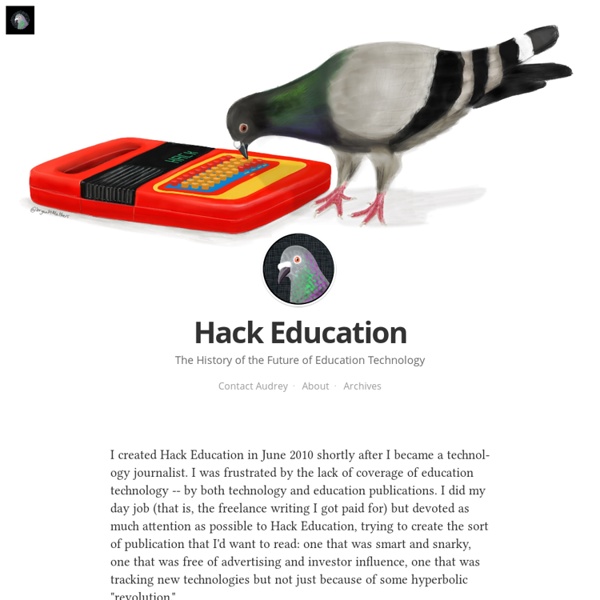



Blog Silvia Zanatta wrote how she incorporated the Classroom Habitudes into her 7th grade classroom in a wonderful post last year. Here, she updates us on her progress of using Heartbreak Mapping and the transformation she’s seen in her students—and her school. One year ago, Angela Maiers asked me to share my students’ work and experiences around Following Their Heartbreak, and what resulted was a blog post that she graciously published on her website. At that time, I had been in the midst of exploring and learning about the Classroom Habitudes and the #youmatter movement with my students. And although my class shared their learning through social media, in my own school I was alone in my journey. As I began to experience the power of these ideas and the impact they made on my students and my teaching, I became excited to share with colleagues at my school.
What Does the ‘Postdigital’ Mean for Education? Three Critical Perspectives on the Digital, with Implications for Educational Research and Practice The principal contribution of this paper is to encourage conversation about what the ‘postdigital’ might mean for education. The intention is not to suggest decisive definitions, but rather to continue what is emerging as a productive speculation on future relationships between technology and the project of education. As will be elaborated further, the ‘digital’, and hence no less the ‘postdigital’, have tended to be fairly marginal concerns within a general project of education that has developed around humanism (Usher and Edwards 1994; Biesta 1998; Lewis and Kahn 2010). In other words, authentic education has tended to be understood in terms of ‘pure’ human relationships between teachers and their students, or amongst constructivist social groupings. Where digital technology has been developed for educational purposes, it tends to be understood as a supplement or addition, applied with the intention of ‘enhancing’ existing pedagogical practices or learning experiences (Bayne 2015).
How To Compile Your Holiday Videos Into A Cool Movie Trailer With iMovie [Mac] You have lots of short videos from your weekend vacation and you want to compile and share the clips. But you have barely had the time to do it. What can you do? Well, if you are a Mac user, you can quickly compile your holiday clips into a movie trailer using iMovie and share the trailer as a ‘teaser’ with your friends. You can then go back to your clips and edit them seriously later on when you have more spare time. For Teachers - Office of Educational Technology Technology is a powerful tool to support teachers. The following resources are available to help teachers transition to using technology to enhance learning activities as well as collaborate and engage with other educators. Featured Resource Future Ready Schools: Professional Learning Toolkit November 2014 The toolkit provides rubrics, checklists and examples to assist district teams as they develop, refine, and evaluate professional learning plans that align with their capacity, learning goals, and standards of professional learning.
Facebook, Google, and Twitter creators apologizing for bad tech: a timeline Ask almost anyone: Our brains are a mess and so is our democracy. In the last several years, we’ve seen increased focus on the crimes of the “attention economy,” the capitalist system in which you make money for enormous tech companies by giving them your personal life and your eyes and your mind, which they can sell ads against and target ads with. The deleterious effects of, say, the wildfire sharing of misinformation in the Facebook News Feed, on things of importance at the level of, say, the sanity of the American electorate, have been up for debate only insofar as we can bicker about how to correct them or whether that’s even possible. And as such, we’ve seen wave after wave of tech’s top designers, developers, managers, and investors coming forward to express regret for what they made. “These aren’t apologies as much as they’re confessions,” education writer Audrey Watters wrote when she described one wave of the trend in early 2018.
2¢ Worth Listen A few weeks ago I worked and attended North Carolina's ISTE affiliate conference. I opened the NCTIES conference with a breakfast keynote address and Marc Prensky closed it with a luncheon keynote the next day. Sadly, I missed the second day of the conference. Education inspection framework (EIF) Skip to main content Tell us whether you accept cookies We use cookies to collect information about how you use GOV.UK. Your School and Google’s Nine Principles of Innovation The other day Kathy Chin Leong published a review of what Google’s chief social evangelist, Gopi Kallayil, calls Google’s Nine Principles of Innovation. I tweeted out the post (as did others) and I know many of my followers linked to it. A major section of my upcoming book will discuss how key elements of innovation strategy are particularly effective in a school setting. Much of what I found in my many school visits resonates with this list of what makes Google one of the most innovative cultures on the planet.
‘Humane Tech or Capitalism Rebranded?’ With Moira Weigel and Ben Tarnoff The tech industry’s promise to build less harmful products and programs is just capitalism’s way of proving that love means never having to say ‘I’m sorry’ Playing for Team Human today, recorded live on the floor at the Personal Democracy Forum 2018, are Moira Weigel and Ben Tarnoff. Moira and Ben will be showing us how the tech industry’s promise to build less harmful products and programs is just capitalism’s way of proving that love means never having to say “I’m sorry.” Moira and Ben co-wrote the brilliant feature article in the Guardian, “Why Silicon Valley Can’t Fix Itself.”
A blog highlighting the implications of technology on teaching and learning, and applying technological solutions to classroom environments. by jb16g Mar 12